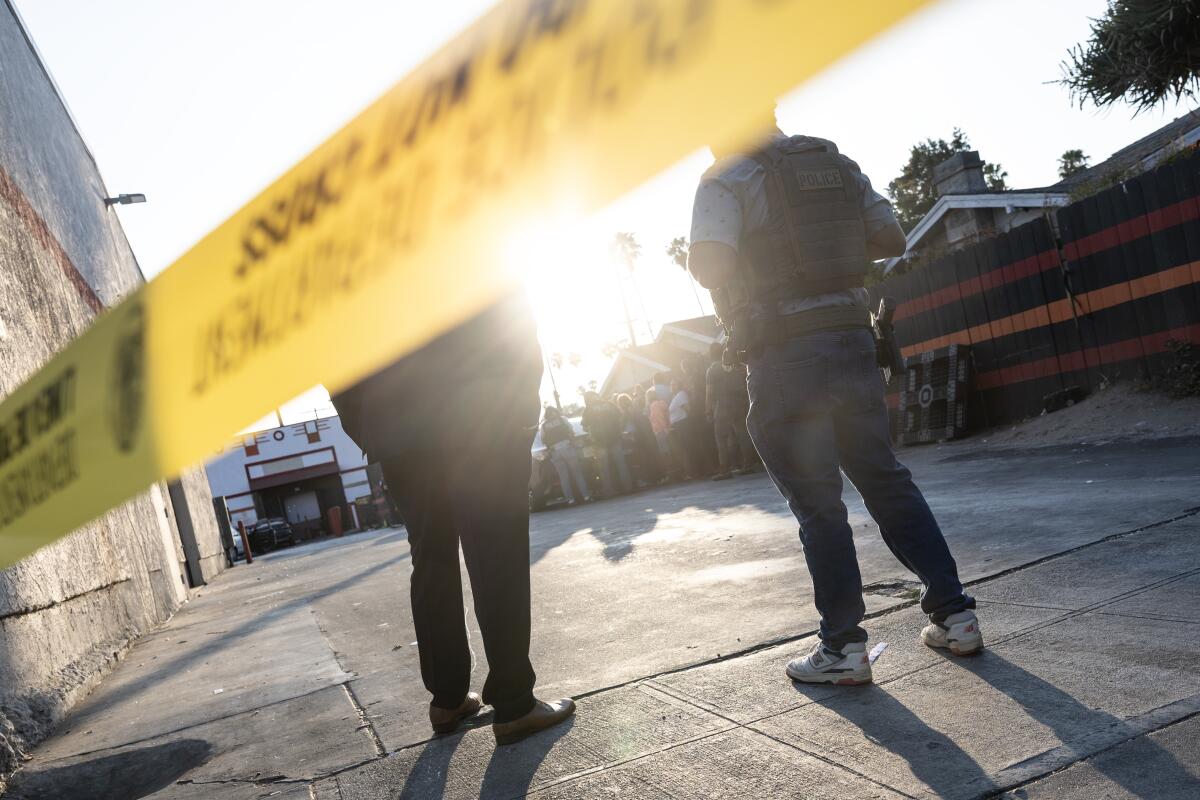California cops accused of misconduct are already shielded by a number of the strictest confidentiality legal guidelines within the nation, however state lawmakers are contemplating including extra layers of secrecy this week.
The state Legislature is weighing Meeting Invoice 1178, which press advocates and police watchdogs mentioned would drastically increase the variety of officers whose personnel information had been exempt from public disclosure, basically gutting police transparency payments handed in 2018 and 2021.
Final-minute adjustments to the invoice final week would have allowed regulation enforcement companies to disclaim requests for public information associated to any officer who has labored an undercover task throughout the final two years, obtained a dying menace within the final 10 years or anybody who has been assigned to a state or federal job power.
The workplace of Assemblywoman Blanca Pacheco (D-Downey) mentioned the invoice was initially “very narrowly targeted” to guard the identifies of energetic undercover officers who didn’t commit misconduct and usually are not below investigation however had been current throughout wrongdoing by others.
Pacehco’s spokeswoman, Alina Evans, mentioned the invoice was amended within the state Senate on the request of the state Division of Justice, and Evans mentioned the invoice is not going to transfer ahead whether it is reinserted.
Requested for particulars about why the California Division of Justice pushed for the modification, a spokesperson for state Atty. Gen. Rob Bonta mentioned: “We regularly provide technical assistance on legislation, but we can’t comment on any specific discussions with legislative offices or committees.”
Opponents contend that the proposal’s unique language may nonetheless permit undercover officers to have their names saved secret even when they’re concerned in a deadly taking pictures or accused of great misconduct, however Evans mentioned their names would nonetheless be topic to disclosure, identical to some other officer’s could be below the present regulation.
The last-minute lobbying push round Pacheco’s proposal is considered one of a number of late bids to water down pro-transparency payments which have been launched this yr, mentioned Shayla Wilson, coverage and advocacy advisor for La Defensa, a felony justice reform advocacy group.
“At a time when public trust in law enforcement continues to dwindle, further redactions in police misconduct records is not the right move,” she mentioned. “Generally the public is unaware of how often these [police misconduct] violations happen, or how egregious they are.”
Transparency advocates have sought to increase public entry to police personnel information, in addition to information associated to civilian oversight our bodies and misconduct litigation. Efforts to open entry to misconduct information have repeatedly run into aggressive opposition from police unions, one of the crucial highly effective political forces within the Capitol.
LAPD officers conduct an operation on Slauson Avenue in July.
(Luke Johnson / Los Angeles Occasions)
The unions and their allies have argued that California’s confidentiality guidelines defend officer security and privateness — and stop so-called doxxing incidents, through which private details about officers is unfold on-line.
LAPD Chief Jim McDonnell didn’t reply to a number of makes an attempt for remark via a spokesperson. The Police Fee, the division’s civilian watchdog, mentioned in an announcement that it helps Pacheco’s laws.
“There is valid concern for the safety of officers whose assignments require anonymity as well as employees who have been subject to death threats — and their families. The Commission does believe that transparency is important but feels it is crucial to strike a balance between the public’s right to know and the safety of officers and their families,” the assertion mentioned.
The fee’s assertion didn’t cite specifics however famous, “there have been times when the disclosure of records has provided safety concerns for officers and by default an [undue] level of access to their families, including their minor children.”
The proposed adjustments to state regulation come amid ongoing litigation over the publication of 1000’s of mugshot-style photographs of LAPD officers obtained by an L.A.-based journalist and the watchdog group Cease LAPD Spying Coalition.
The journalist, Ben Camacho, obtained the photographs by way of a California Public Data Act request and revealed them on a searchable web site referred to as Watch the Watchers. The positioning describes itself as a transparency software for individuals to establish officers who’ve dedicated misconduct.
However shortly after the location went stay in March 2023, LAPD officers introduced that that they had inadvertently launched photographs of officers who labored undercover. The disclosure led to a tangle of authorized instances, together with a declare filed by town of L.A. in opposition to Camacho and his group making an attempt to claw again the images.
Final June, town settled the go well with, agreeing to pay the authorized payments for Camacho and Cease LAPD Spying. Within the course of, town has backed away from preliminary claims that most of the officers whose photographs had been launched had been put in peril as a result of they labored undercover. Police unions additionally sued over the photographs, making comparable arguments concerning the security of officers being compromised, however their declare in opposition to the LAPD was dropped in April.
Los Angeles Metropolis Atty. Hydee Feldstein Soto is amongst those that has lobbied California lawmakers to weaken the state’s public information regulation. In the summertime of 2023, she proposed a change that will permit authorities companies to say no future public information requests that search “images or data that may personally identify” workers.


